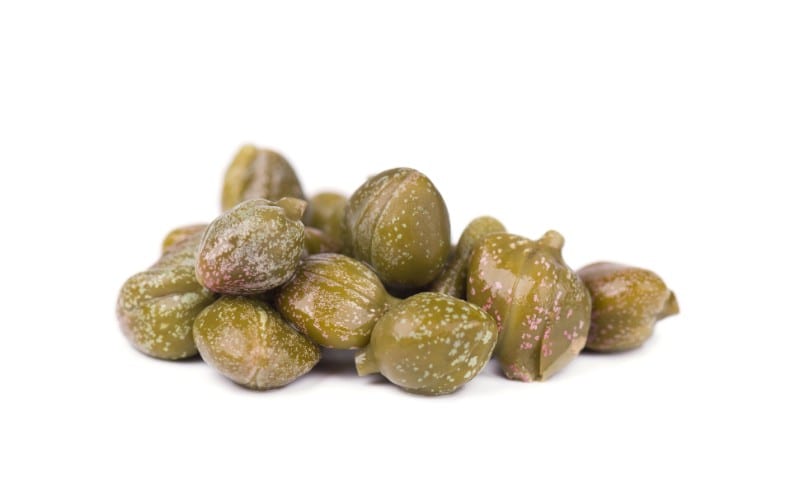Capers and Their Health Benefits
Capers are the immature flower buds of the caper bush. The Latin name is Capparis Spinosa. It’s fruits and caper berries are edible and nutritious. This plant grows in arid and semi-arid zones of the Mediterranean, Asia, the Pacific Islands, Eastern Africa, Madagascar, and Australia. The caper plant or bush starts growing after spring rains (during April-May), disappears when temperatures drop (September-October), and survives winter as a stump. It can grow and flourish in poor, rocky soil and resists drought and high temperatures.
Capers and caper berries have been traditionally consumed for nearly 9,000 years. Ancient civilizations used it as a medicine and for healthy meals. They have been known to treat spleen diseases, paralysis, provide pain relief, and prevent erection disorders and convulsions. Originally capers were collected from wild plants. But people began cultivating them in the last 40-50 years. Capers are produced mainly in Turkey, Morocco, Spain, Italy, France, and Tunisia. UK and the US are the main importers of capers and caper berries.

Capers are usually pickled in salt and vinegar and used as an appetizer. You can find several Mediterranean salads or dishes to contain capers. They have a sharp, pungent flavor that adds to the texture of various dishes.
Caper buds and fruits have active compounds that are used to improve conditions like diabetes, water retention, boils, gout, pain, and rheumatism. They have antioxidants and anti-inflammatory properties which make them beneficial for our health. Some people may find capers extremely bitter in taste. This is why capers are cured to reduce the pungent flavor and bitterness.
Capers contain phenols which are its main active compounds. Flavonoids such as quercetin, kaempferol, ginkgetin, isoginketin, and its derivatives are found in capers. Other active compounds include alkaloids, sulfur-containing glucosinolates (glucocapparin, glucobrassicin, and derivatives) and their antioxidant breakdown products (isothiocyanates or mustard oil). Carotenoids such as pro-Vitamin A, terpenoids like Vitamin E, and Vitamin C are also found in capers and caper berries. The phenolic and vitamin content depends on the region where capers are cultivated.
Studies have compared capers grown in different Mediterranean countries to see the flavor and vitamin content. Tunisian capers were found to be the richest in flavonoids while Moroccan capers had the highest Vitamin A content. Italian capers had the highest rutin content and Spanish capers where highest in Vitamin E.
Capers and caper berries are fermented in brine to reduce their bitterness. During this process, part of the rutin is broken down to quercetin. This is when salt is added in copious amounts to change the flavor. Storage conditions can affect the nutritional and vitamin content of capers.

Cured capers are very high in salt but low in calories. If you eat them raw, they are healthier option than other snacks or berries. You can also cure fresh capers by yourself without adding too much salt or brine. Canned capers could be used to add salt to a dish. If you use canned capers to a salad or salmon, you don’t need to add salt. A great way of reducing the salt in canned capers is to rinse them.
Free radicals can build up in the body to damage the DNA, proteins, and important molecules. Antioxidants in capers prevent this from happening by breaking down free radicals. They also block the enzymes and retaining minerals needed to produce free radicals. They boost the levels of antioxidants, molecules, and enzymes. Capers and caper extracts have been known to be beneficial for the heart, skin, and liver.
Caper’s essential oil acts as an anti-inflammatory agent and reduces the production of inflammatory agents in the body. These studies have yet to be done on a larger level but capers can lower inflammation and calm your gut. Studies have also been found to prove that caper and caper extracts can kill stomach and liver cancer cells. They reduce the production of proteins that help cancer cells survive. Capers also induce the productions of proteins that trigger cancer cell death. Caper and caper extract lowered blood sugar in diabetic and obese rats. It increases sugar breakdown and insulin sensitivity. Caper buds can also act as antiviral agents and reduce markers showing liver damage.
There has been insufficient evidence and research done to show the health benefits of capers. Ancient medicinal systems in various countries believed capers could fight diabetes, skin allergies, arthritis, inflammation, liver damage, Alzheimer’s, and support weight loss. There is no denying the nutritional benefits of capers in food so you should add it to your diet. Consult a doctor or medical expert before changing your diet. Capers can be included in a variety of meals such as salads, fish, curries, appetizers, cold soups, and meats. Capers are high in sodium so should be avoided by people on a low-sodium diet or with high blood pressure. You should also check for any food allergies if you want to add capers to your diet.
